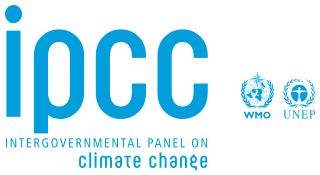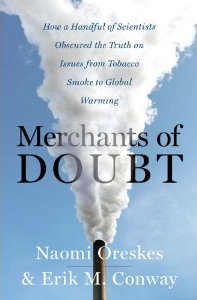Environmental skepticism is the belief that statements by environmentalists, and the environmental scientists who support them, are false or exaggerated. The term is also applied to those who are critical of environmentalism in general. It can additionally be defined as doubt about the authenticity or severity of environmental degradation. Environmental skepticism is closely linked with anti-environmentalism and climate change denial. Environmental skepticism can also be the result of cultural and lived experiences.

Siegfried Fred Singer was an Austrian-born American physicist and emeritus professor of environmental science at the University of Virginia, trained as an atmospheric physicist. He was known for rejecting the scientific consensus on several issues, including climate change, the connection between UV-B exposure and melanoma rates, stratospheric ozone loss being caused by chlorofluoro compounds, often used as refrigerants, and the health risks of passive smoking.

The global warming controversy concerns the public debate over whether global warming is occurring, how much has occurred in modern times, what has caused it, what its effects will be, whether any action can or should be taken to curb it, and if so what that action should be. In the scientific literature, there is a strong consensus that global surface temperatures have increased in recent decades and that the trend is caused by human-induced emissions of greenhouse gases. No scientific body of national or international standing disagrees with this view, though a few organizations with members in extractive industries hold non-committal positions, and some have attempted to convince the public that climate change is not happening, or if the climate is changing it is not because of human influence, attempting to sow doubt in the scientific consensus.

Stephen Henry Schneider was Professor of Environmental Biology and Global Change at Stanford University, a Co-Director at the Center for Environment Science and Policy of the Freeman Spogli Institute for International Studies and a Senior Fellow in the Stanford Woods Institute for the Environment. Schneider served as a consultant to federal agencies and White House staff in the Richard Nixon, Jimmy Carter, Ronald Reagan, George H. W. Bush, Bill Clinton, George W. Bush and Barack Obama administrations.

Environmental science is an interdisciplinary academic field that integrates physics, biology, and geography to the study of the environment, and the solution of environmental problems. Environmental science emerged from the fields of natural history and medicine during the Enlightenment. Today it provides an integrated, quantitative, and interdisciplinary approach to the study of environmental systems.

Patrick J. Michaels was an American agricultural climatologist. Michaels was a senior fellow in environmental studies at the Cato Institute until 2019. Until 2007, he was research professor of environmental sciences at the University of Virginia, where he had worked from 1980.

The Amundsen Sea, an arm of the Southern Ocean off Marie Byrd Land in western Antarctica, lies between Cape Flying Fish to the east and Cape Dart on Siple Island to the west. Cape Flying Fish marks the boundary between the Amundsen Sea and the Bellingshausen Sea. West of Cape Dart there is no named marginal sea of the Southern Ocean between the Amundsen and Ross Seas. The Norwegian expedition of 1928–1929 under Captain Nils Larsen named the body of water for the Norwegian polar explorer Roald Amundsen while exploring this area in February 1929.

Kevin Edward Trenberth is part of the Climate Analysis Section at the US NCAR National Center for Atmospheric Research. He was a lead author of the 2001 and 2007 IPCC Scientific Assessment of Climate Change and serves on the Scientific Steering Group for the Climate Variability and Predictability (CLIVAR) program. He chaired the WCRP Observation and Assimilation Panel from 2004 to 2010 and chaired the Global Energy and Water Exchanges (GEWEX) scientific steering group from 2010 to 2013. In addition, he served on the Joint Scientific Committee of the World Climate Research Programme, and has made significant contributions to research into El Niño-Southern Oscillation.
Spiritual ecology is an emerging field in religion, conservation, and academia recognizing that there is a spiritual facet to all issues related to conservation, environmentalism, and earth stewardship. Proponents of Spiritual Ecology assert a need for contemporary conservation work to include spiritual elements and for contemporary religion and spirituality to include awareness of and engagement in ecological issues.

Environmentalism or environmental rights is a broad philosophy, ideology, and social movement regarding concerns for environmental protection and improvement of the health of the environment, particularly as the measure for this health seeks to incorporate the impact of changes to the environment on humans, animals, plants and non-living matter. While environmentalism focuses more on the environmental and nature-related aspects of green ideology and politics, ecologism combines the ideology of social ecology and environmentalism. Ecologism is more commonly used in continental European languages, while environmentalism is more commonly used in English but the words have slightly different connotations.

Timothy Fridtjof Flannery is an Australian mammalogist, palaeontologist, environmentalist, conservationist, explorer, author, science communicator, activist and public scientist. He was awarded Australian of the Year in 2007 for his work and advocacy on environmental issues.
Cook Ice Shelf is an ice shelf about 55 miles (90 km) wide, occupying a deep recession of the coastline between Cape Freshfield and Cape Hudson, to the east of Deakin Bay.

Environmental art is a range of artistic practices encompassing both historical approaches to nature in art and more recent ecological and politically motivated types of works. Environmental art has evolved away from formal concerns, for example monumental earthworks using earth as a sculptural material, towards a deeper relationship to systems, processes and phenomena in relationship to social concerns. Integrated social and ecological approaches developed as an ethical, restorative stance emerged in the 1990s. Over the past ten years environmental art has become a focal point of exhibitions around the world as the social and cultural aspects of climate change come to the forefront.

Human overpopulation is the concept of a human population becoming too large to be sustained by its environment or resources in the long term. The idea is usually discussed in the context of world population, though it may also concern regions. Human population growth has increased in recent centuries due to medical advancements and improved agricultural productivity. Those concerned by this trend argue that it results in a level of resource consumption which exceeds the environment's carrying capacity, leading to population overshoot. The concept is often discussed in relation to other population concerns such as demographic push and depopulation, as well as in relation to resource depletion and the human impact on the environment.
Religion and environmentalism is an emerging interdisciplinary subfield in the academic disciplines of religious studies, religious ethics, the sociology of religion, and theology amongst others, with environmentalism and ecological principles as a primary focus.

James Mark Court Delingpole is an English writer, journalist, and columnist who has written for a number of publications, including the Daily Mail, Daily Express, The Times, The Daily Telegraph, and The Spectator. He is a former executive editor for Breitbart London, and has published several novels and four political books. He describes himself as a libertarian conservative. He has frequently published articles promoting climate change denial. and expressing opposition to wind power.

Christian views on environmentalism vary among different Christians and Christian denominations.

The IPCC Fourth Assessment Report (AR4) is a report on climate change created with the help of a large number of contributors, both scientists and governmental representatives. There has been considerable political controversy over a small number of errors found in the report, and there have been calls for review of the process used to formulate the report. The overwhelming majority view of scientists with expertise in climate change is that errors, when found, are corrected, and the issues as identified do not undermine the conclusions of the report that the climate system is warming in response to increased levels of greenhouse gases, largely due to human activities.
Watts Up With That? (WUWT) is a blog promoting climate change denial that was created by Anthony Watts in 2006.

Merchants of Doubt: How a Handful of Scientists Obscured the Truth on Issues from Tobacco Smoke to Global Warming is a 2010 non-fiction book by American historians of science Naomi Oreskes and Erik M. Conway. It identifies parallels between the global warming controversy and earlier controversies over tobacco smoking, acid rain, DDT, and the hole in the ozone layer. Oreskes and Conway write that in each case "keeping the controversy alive" by spreading doubt and confusion after a scientific consensus had been reached was the basic strategy of those opposing action. In particular, they show that Fred Seitz, Fred Singer, and a few other contrarian scientists joined forces with conservative think tanks and private corporations to challenge the scientific consensus on many contemporary issues.














